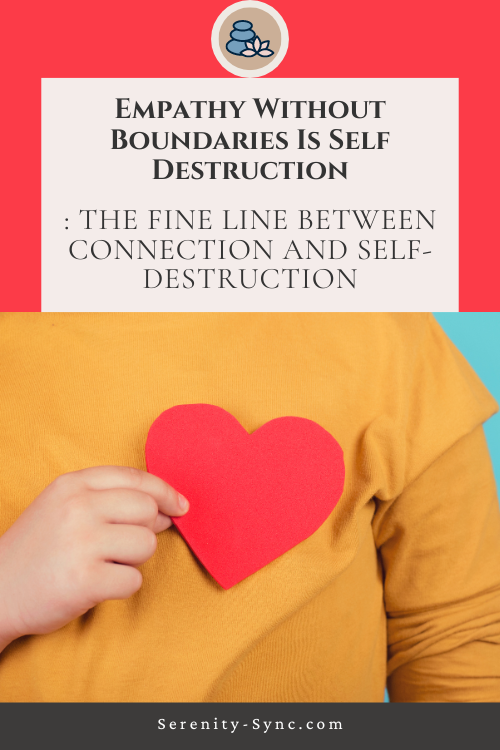In Brief
Empathy without boundaries is self destruction, impacting emotional well-being and relationships. Setting limits is crucial to prevent emotional drain, burnout, neglect of self-care, and more. Learn how to balance empathy and self-preservation for healthier interactions.
The Beauty and Burden of Empathy
Empathy is the ability to understand and share the feelings of others, differentiating it from sympathy which involves feeling compassion for someone. It creates a deep emotional connection between individuals, fostering vulnerability and trust. However, excessive empathy can lead to emotional fatigue, affecting relationships and personal well-being.
Fun Fact
The term “empathy” was first coined in the early 20th century by psychologist Edward Titchener, who believed it to be a fundamental part of human nature.
The Thin Line: Empathy without Boundaries
Empathy without boundaries refers to the lack of limits in absorbing and internalizing others’ emotions. This can result in emotional drain, where individuals feel exhausted and overwhelmed by the constant emotional load. Burnout and neglect of self-care often follow, as one’s focus shifts entirely to others, leading to a loss of identity and self-neglect.
Definition and Dangers
Empathy without boundaries poses risks such as losing oneself in others’ emotions, resulting in blurred personal boundaries and identity crises. This can lead to emotional exhaustion and a sense of being consumed by others’ feelings, impacting one’s mental and emotional well-being.
Emotional Drain
Constantly absorbing and carrying the emotional burdens of others without setting limits can lead to emotional drain. This exhaustion stems from overextending oneself emotionally, resulting in feelings of emptiness and fatigue.
Burnout and Exhaustion
Without boundaries, individuals are susceptible to burnout as they pour all their emotional energy into supporting others, neglecting their own needs in the process. This can result in physical and emotional exhaustion, impacting overall health and happiness.
Neglecting Self-Care
Empathy without boundaries often leads to neglecting self-care practices, as individuals prioritize the needs of others above their own well-being. This neglect can have detrimental effects on mental, emotional, and physical health in the long run.
Losing Identity
When empathy knows no boundaries, individuals may lose sight of their own identity and needs, focusing solely on others. This can result in a lack of self-awareness and personal growth, hindering one’s ability to establish a strong sense of self.
Signs of Self-Destruction Through Empathy
Recognizing the signs of self-destruction through empathy is crucial in preventing long-term negative consequences. Resentment, unhealthy relationships, isolation, lack of assertiveness, and diminished self-esteem are common indicators of empathy gone awry.
Resentment and Bitterness
Excessive empathy without boundaries can breed resentment and bitterness towards others, especially when one feels overwhelmed by the emotional demands placed upon them. This can lead to strained relationships and a sense of emotional exhaustion.
Unhealthy Relationships
Empathy without limits can result in unhealthy relationship dynamics, where one party constantly sacrifices their well-being for the sake of others. This imbalance can lead to codependency and a lack of mutual respect and understanding.
Isolation and Loneliness
Individuals who lack boundaries in empathy may find themselves isolated and lonely despite being surrounded by others. The inability to establish healthy emotional boundaries can lead to a sense of disconnect and alienation from those around them.
Lack of Assertiveness
Empathy without boundaries can diminish one’s ability to assert their own needs and desires, leading to a pattern of self-sacrifice and people-pleasing behavior. This lack of assertiveness can erode self-confidence and autonomy over time.
Impact on Self-Esteem
Continuous selfless empathy can take a toll on self-esteem, as individuals prioritize others’ feelings over their own worth and value. This can result in feelings of inadequacy and a diminished sense of self-worth.
Nurturing Empathy with Self-Compassion
Practicing empathy with healthy boundaries involves cultivating self-compassion, emotional resilience, and self-care practices. Setting limits, prioritizing self-love, and balancing giving and receiving are essential in maintaining a harmonious connection with others while preserving one’s well-being.
Importance of Self-Compassion
Self-compassion is vital in nurturing empathy without boundaries, as it allows individuals to extend the same care and understanding to themselves that they offer to others. This self-kindness promotes emotional balance and prevents emotional exhaustion.
Building Emotional Resilience
Emotional resilience is key in navigating the complexities of empathy, helping individuals bounce back from emotional challenges and setbacks. Cultivating resilience enables one to maintain healthy boundaries while engaging empathetically with others.
Setting Healthy Boundaries
Establishing clear emotional boundaries is essential in safeguarding one’s emotional well-being and identity. By setting limits on how much emotional labor one can undertake, individuals can protect themselves from burnout and emotional fatigue.
Practicing Self-Care
Self-care is a fundamental aspect of nurturing empathy, as it ensures that individuals prioritize their own needs and well-being alongside those of others. Engaging in self-care activities promotes mental and emotional balance, preventing neglect and burnout.
Balancing Giving and Receiving
Maintaining a balance between giving and receiving in relationships is crucial for sustainable empathy. By acknowledging one’s own needs and limitations, individuals can engage empathetically with others without sacrificing their own emotional health.
Did you know that studies have shown that practicing empathy can actually increase the levels of oxytocin in the brain, leading to a greater sense of bonding and connection with others?
Strategies for Sustainable Empathy
Mindful Listening
Listening is not just about hearing words; it’s about truly understanding the emotions behind them. Mindful listening involves giving your full attention to the speaker, being present in the moment, and showing genuine interest in their feelings.
Emotional Boundaries
Setting emotional boundaries is crucial for maintaining your well-being while empathizing with others. It involves recognizing when to say no, understanding your limits, and prioritizing your mental and emotional health.
Seeking Support
Don’t be afraid to seek support from friends, family, or a therapist when you feel overwhelmed. Talking about your emotions and experiences can help you process them and prevent emotional burnout.
Practicing Empathy in Moderation
While empathy is a valuable trait, it’s essential to practice it in moderation to avoid emotional fatigue. Find a balance between supporting others and taking care of yourself.
Cultivating Emotional Awareness
Developing emotional awareness allows you to understand your own feelings better, which in turn enhances your ability to empathize with others. Take time to reflect on your emotions and how they influence your interactions.
The Role of Boundaries in Empathy
Protecting Your Energy
Protecting your energy means recognizing when certain people or situations drain you emotionally. Learning to set boundaries and prioritize self-care helps you preserve your emotional well-being.
Saying No with Kindness
Saying no doesn’t make you selfish; it means you value your mental health. Communicate your boundaries kindly but firmly to maintain healthy relationships and prevent resentment.
Honoring Your Needs
Take time to prioritize your needs and engage in activities that bring you joy and relaxation. Self-care is not selfish; it’s necessary for maintaining a healthy balance in your life.
Creating Emotional Space
Emotional space allows you to process your feelings without being overwhelmed by others’ emotions. Find ways to create boundaries that protect your emotional well-being.
Respecting Personal Limits
Know your limits and communicate them clearly to those around you. Respecting your personal boundaries is essential for fostering healthy relationships and maintaining emotional resilience.
The Power of Self-Compassion
Self-Love and Acceptance
Practicing self-love and acceptance allows you to embrace your imperfections and treat yourself with kindness. Cultivate a positive relationship with yourself to enhance your capacity for empathy.
Overcoming Guilt and Perfectionism
Let go of guilt and perfectionist tendencies that hinder your self-compassion. Embrace your mistakes as opportunities for growth and learn to forgive yourself.
Embracing Vulnerability
Being vulnerable is a strength, not a weakness. Embrace your vulnerability as a way to connect more deeply with others and foster authentic relationships based on trust and empathy.
Forgiving Yourself and Others
Forgiveness is a powerful tool for releasing negative emotions and moving forward. Practice forgiveness towards yourself and others to free yourself from resentment and cultivate empathy.
Fostering Inner Peace
Inner peace comes from accepting yourself fully and finding harmony within. By nurturing a sense of inner peace, you can approach empathy from a place of strength and compassion.
Fun Fact
In ancient Greece, empathy was believed to be a gift from the gods, showing the importance placed on understanding and sharing the feelings of others.

